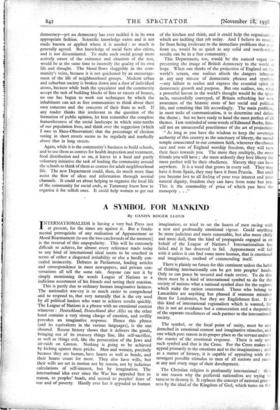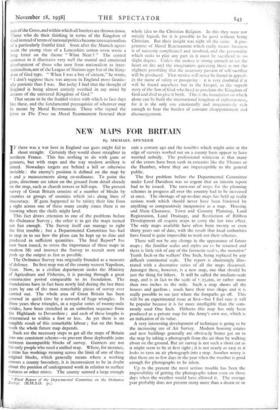A SYMBOL FOR MANKIND
By CANON ROGER LLOYD
This is partly due to ordinary human imaginative laziness. The nationalist war-cry is so much easier to comprehend and to respond to, that very naturally that is the cry used by all political leaders who want to achieve results quickly. The League of Nations is a phrase with no emotional content whatever : Deutschland, Deutschland fiber Alles on the other hand contains a very strong charge of emotion, and swiftly provokes an imaginative response. Hence this phrase (and its equivalents in the various languages), is the one shouted. Recent history shows that it delivers the goods, bringing out of its treasury things fine, hIce self-sacrifice, as well as things evil, like the persecution of the Jews and air-raids on Canton. Nothing is going to be achieved by kicking against these pricks. Men and women, precisely because they are human, have hearts as well as heads, and their hearts count for more. They also have wills, but their wills are set in motion not by reason, not by judicious calculations of self-interest, but by imagination. The international idea ever since the War has appealed first to reason, to peoples' heads, and second to peoples' fears of war and of poverty. Hardly ever has it appealed to human imagination, or tried to set the hearts of men racing with a new and profoundly emotional vigour. Could anything be more judicious and more reasonable, but also more chilly and more dull, than the kind of propaganda engaged in on behalf of the League of Nations ? Internationalism has failed and it has deserved to fail. Appeasement will fail with it unless it can find some more human, that is emotional and imaginative, method of commending itself.
There is plainly no future for this continent unless the habit of thinking internationally can be got into peoples' heads. Only so can peace be secured and trade revive. To do this there must be a kind of international symbol to do for the society of nations what a national symbol does for the regions which make the nation concerned. Those who belong to Lancashire are anything but pleased if someone mistakes them for Londoners, but they are Englishmen first. It is this kind of international regionalism which is wanted, for this is not an avoidance but a consecration and a deepening of the separate excellences of each partner to the international society.
The symbol, or the focal point of unity, must be one drenched in emotional content and imaginative stimulus, and one which puts reason in its proper place as the servant and not the master of the emotional response. There is only one such symbol and that is the Cross. For the Cross makes its appeal primarily to the emotions and to the imaginations ; and as a matter of history, it is capable of appealing with the strongest possible stimulus to men of all nations and races at any and every stage of their development.
The Christian religion is profoundly international : that is one reason why the perfervid nationalists are trying to tame or,to destroy it. It replaces the concept of national great- ness by the ideal of the Kingdom of God, which turns on the axis of the Cross, and within which all barriers are thrown down. Those who do their thinking in terms of the Kingdom of God instead of terms of national politics become internationalists of a particularly fruitful kind. Soon after the Munich agree- ment the young vicar of a Lancashire cotton town wrote a long letter on the theme " What Next ? " The central sentence in it illustrates very well the mental and emotional development of those who turn from nationalism to inter- nationalism, not of the League of Nations type but of the King- dom of God type. " When I was a boy of sixteen," he wrote, " I don't suppose there was anyone in England more fanatic- ally patriotic than I was. But today I find that the thought of England is being almost entirely overlaid in my mind by dreams of the universal Kingdom of God."
That seems to be the fruitful vision with which to face days like these, and the fundamental prerequisite of whatever may be meant by Moral Rearmament. Those who signed the letter to The Times on Moral Rearmament fastened their whole idea to the Christian Religion. In this they were not strictly logical, for it is possible to be good without being Christian. But their insight was right all the same. A pro- gramme of Moral Rearmament which really means business is of necessity complicated and involved, and the personality which seeks to play any part in it must be sacrificial to no slight degree. Unless the motive is strong enough to set the heart on fire and the imagination quivering there is not the slightest possibility that the necessary passion of self-sacrifice will be produced. That motive will never be found in appeals in the name of safety or prosperity : it is very doubtful if it will be found anywhere but in the Gospel, in the superb story of the Son of God who lived to proclaim the Kingdom of God and died to give it birth. This is the foundation on which alone can be built the international kingdom of righteousness, for it is the only one emotionally and imaginatively rich enough to bear the burden of constant disappointment and discouragement.

























































 Previous page
Previous page